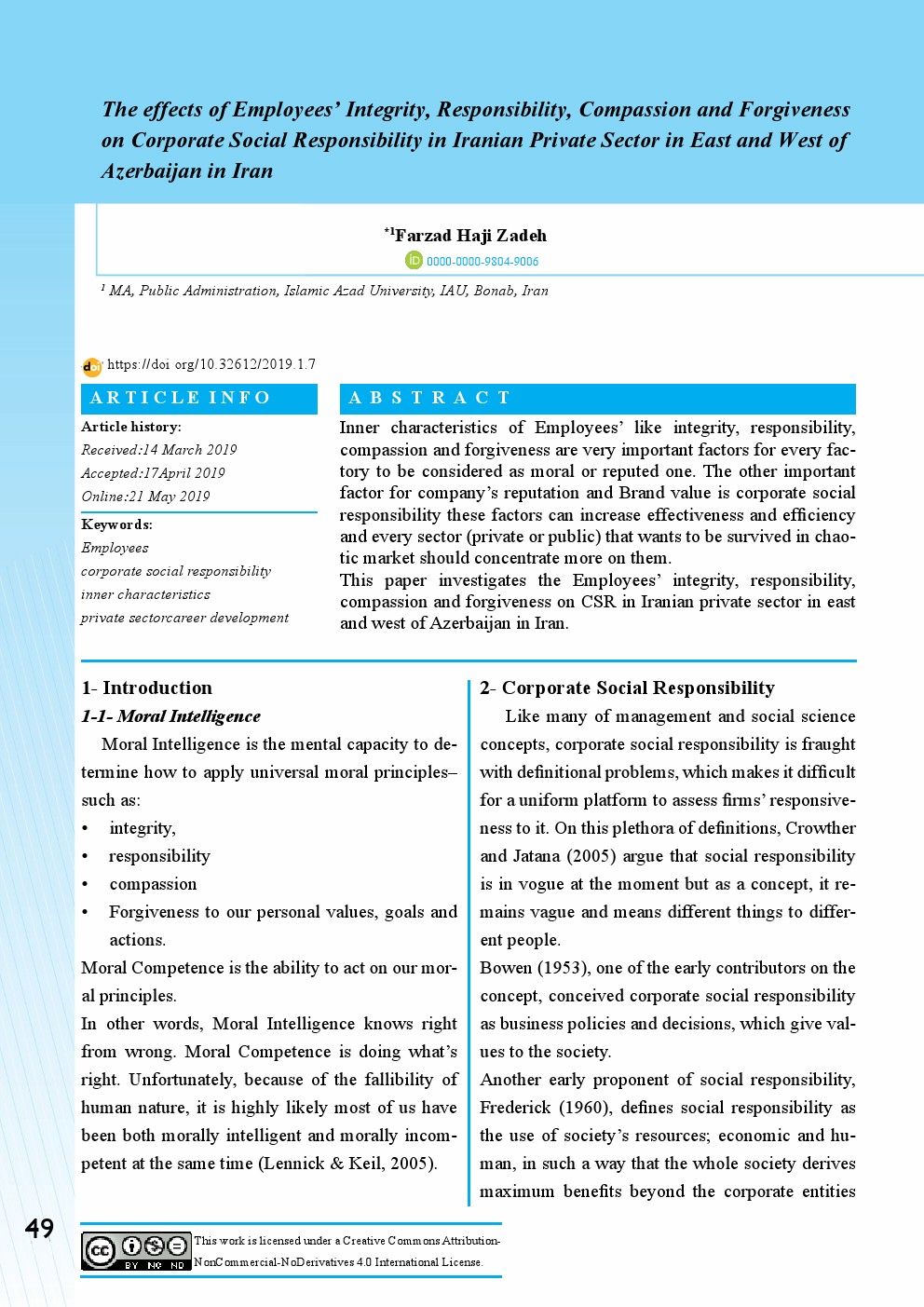The effects of Employees’ Integrity, Responsibility, Compassion and Forgiveness on Corporate Social Responsibility in Iranian Private Sector in East and West of Azerbaijan in Iran
Main Article Content
Abstract
Inner characteristics of Employees’ like integrity, responsibility, compassion and forgiveness are very important factors for every factory to be considered as moral or reputed one. The other important factor for company’s reputation and Brand value is corporate social responsibility these factors can increase effectiveness and efficiency and every sector (private or public) that wants to be survived in chaotic market should concentrate more on them.
This paper investigates the Employees’ integrity, responsibility, compassion and forgiveness on CSR in Iranian private sector in east and west of Azerbaijan in Iran.
Downloads
Download data is not yet available.
Article Details
How to Cite
Haji Zadeh, F. (2019). The effects of Employees’ Integrity, Responsibility, Compassion and Forgiveness on Corporate Social Responsibility in Iranian Private Sector in East and West of Azerbaijan in Iran. JMDMA, 1(2), 49-52. https://doi.org/10.3261212/2019.1.7
Section
Articles

This work is licensed under a Creative Commons Attribution-NonCommercial-NoDerivatives 4.0 International License.
References
1- Abele, A. E., & Wiese, B. (2008). The nomological network of self-management strategies and career success. Journal of Occupational and Organizational Psychology, 73, 490–497.
2- Backman, J. (1975), Social Responsibility and Accountability, New York University Press, New York, NY.
3- Bowen, H.R. (1953), Social Responsibilities of the Businessman, Harper & Row, New York, NY.
4- Crowther, D. and Jatana, R. (2005), ‘‘Is CSR profitable?’’, in Crowther, D. and Jatana, R. (Eds), Representations of Social Responsibility, Vol. 1, ICFAI University Press, Hyderabad.
5- Danaee Fard Hassan, Mohammad Reza Noruzi, (2013), A Research Paper on the Evolution of Corporate Social Responsibility Enigma in the Middle of Accounting History in Iranian Private Companies; is there any Accounting Background or not?, III International Conference on Luca Pacioli in Accounting History and III Balkans and Middle East Countries Conference on Accounting and Accounting History, 19-22 June 2013, Istanbul, Turkey.
6- Danaee Fard Hassan, Mohammad Reza Noruzi, (2013), Accounting Policy, Corporate Governance and Corporate Social Responsibility: Understanding the Effects of Iranian National Accounting Policy on the Occurrence of Corporate Social Responsibility; the Role of Accounting History and Best Practices, III International Conference on Luca Pacioli in Accounting History and III Balkans and Middle East Countries Conference on Accounting and Accounting History, 19-22 June 2013, Istanbul, Turkey.
7- Davis, K. (1973), ‘‘The case for and against business assumption of social responsibilities’’, Academy of Management Journal, Vol. 16, pp. 312-22.
8- Frederick, W.C. (1960), ‘‘The growing concern over business responsibility’’, California Management Review, Vol. 2, pp. 54-61.
8- Hauser, Marc D. (2006). Moral Minds; The Nature of Right and Wrong. (pp. 419-420).
http://blog.800ceoread.com/2005/09/29/what-is-moral-intelligence/ Lennick Doug and Kiel Fred, (2005), What is Moral Intelligence? Available at:
9- Obalola, Musa, (2008),”Beyond philanthropy: corporate social responsibility in the Nigerian insurance industry”, Social Responsibility Journal, Vol. 4 Iss: 4 pp. 538 - 548
10- Rahimi, Gholam Reza, Farhad Nezhad Haj Ali Irani, Mohammad Reza Noruzi, (2011), A Survey on the effects of employees’ Moral Intelligence on Job Success in Islamic Azad University in Local 13, Interdisciplinary journal of Contemporary Research in Business, Vol. 2. No. 11 (2011), March ISSN: 2073-7122 pp. 675-680
2- Backman, J. (1975), Social Responsibility and Accountability, New York University Press, New York, NY.
3- Bowen, H.R. (1953), Social Responsibilities of the Businessman, Harper & Row, New York, NY.
4- Crowther, D. and Jatana, R. (2005), ‘‘Is CSR profitable?’’, in Crowther, D. and Jatana, R. (Eds), Representations of Social Responsibility, Vol. 1, ICFAI University Press, Hyderabad.
5- Danaee Fard Hassan, Mohammad Reza Noruzi, (2013), A Research Paper on the Evolution of Corporate Social Responsibility Enigma in the Middle of Accounting History in Iranian Private Companies; is there any Accounting Background or not?, III International Conference on Luca Pacioli in Accounting History and III Balkans and Middle East Countries Conference on Accounting and Accounting History, 19-22 June 2013, Istanbul, Turkey.
6- Danaee Fard Hassan, Mohammad Reza Noruzi, (2013), Accounting Policy, Corporate Governance and Corporate Social Responsibility: Understanding the Effects of Iranian National Accounting Policy on the Occurrence of Corporate Social Responsibility; the Role of Accounting History and Best Practices, III International Conference on Luca Pacioli in Accounting History and III Balkans and Middle East Countries Conference on Accounting and Accounting History, 19-22 June 2013, Istanbul, Turkey.
7- Davis, K. (1973), ‘‘The case for and against business assumption of social responsibilities’’, Academy of Management Journal, Vol. 16, pp. 312-22.
8- Frederick, W.C. (1960), ‘‘The growing concern over business responsibility’’, California Management Review, Vol. 2, pp. 54-61.
8- Hauser, Marc D. (2006). Moral Minds; The Nature of Right and Wrong. (pp. 419-420).
http://blog.800ceoread.com/2005/09/29/what-is-moral-intelligence/ Lennick Doug and Kiel Fred, (2005), What is Moral Intelligence? Available at:
9- Obalola, Musa, (2008),”Beyond philanthropy: corporate social responsibility in the Nigerian insurance industry”, Social Responsibility Journal, Vol. 4 Iss: 4 pp. 538 - 548
10- Rahimi, Gholam Reza, Farhad Nezhad Haj Ali Irani, Mohammad Reza Noruzi, (2011), A Survey on the effects of employees’ Moral Intelligence on Job Success in Islamic Azad University in Local 13, Interdisciplinary journal of Contemporary Research in Business, Vol. 2. No. 11 (2011), March ISSN: 2073-7122 pp. 675-680

